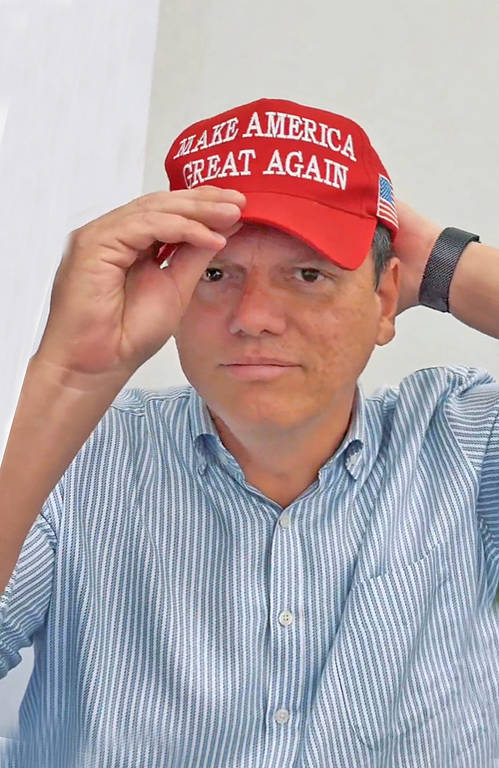Trump's tariff could reduce São Paulo's GDP by up to 2.7%, says Tarcísio

The governor of São Paulo , Tarcísio de Freitas (Republicans), said this Saturday (26) that the tariffs imposed by the president of the United States , Donald Trump , on Brazil could cause the state's economy to shrink by up to 2.7%.
"The effect could be very severe. This [tariff hike] could have an effect that could vary from 0.3% to 2.7% of GDP, from 44,000 to 120,000 fewer jobs, and a loss of wages of R$3 billion to R$7 billion per year," he said.
During the panel "The Brazil that is Built in the States", at the Expert XP 2025 event, Tarcísio also stated alongside governors Ratinho Junior (PSD), from Paraná, and Ronaldo Caiado ( União Brasil ), from Goiás, that he is preparing measures to mitigate the impact of the surcharges, which should come into effect on Friday (1st) if the Brazilian government does not reach an agreement with Washington.

Among the measures, Tarcísio cited the measure announced by the state this week of a subsidized credit line of R$200 million for companies affected by the tariffs.
Announced on Wednesday (23), the Giro Exportador line provides interest rates starting at 0.27% per month + IPCA, a payment term of up to five years and a grace period of up to 12 months. The financing limit will be up to R$20 million per customer, according to the government.
"What worries me is that a global company like Caterpillar, which exports a lot to the US, might turn off the switch here and turn on the switch elsewhere to do that export. I'm worried about Embraer, which sends executive and commercial aircraft, and the orange industry," Tarcísio said at the event.
Another measure, not yet officially announced, but mentioned by the governor on Tuesday (22) and this Saturday, is the release of ICMS credits to export sectors.
"We are reaching out to American parliamentarians, counterparts, and American companies, and people in the American government who can be sensitive to the scale of the problem. We are doing this professionally, quietly, to see if we can mitigate these effects," he said.
Tarcísio stated, in an indirect criticism of the Lula (PT) government, that today we live in a time in which people want to take political advantage of everything and that "we will never strengthen the employee by harming the employer."
"When we talk about sovereignty, the worst attack on sovereignty is internal division. Internal division is what weakens the country. So, if we don't put the ball on the ground, don't act like adults, and don't solve the problem, Brazil will be the one who loses," he said.
Ratinho Junior and Ronaldo Caiado, who also participated in the panel and, like Tarcísio, are emerging as possible candidates for the 2026 elections , also criticized the president.
"We saw everyone raise the tariff to 15%, and Brazil keeps coming up with a catchphrase: 'He's the emperor of the world .' You see, he's not responsible at all; he's doing this out of ideological tension," Caiado said after citing the effects of the tariff hike on the meat and sugar industries.
Ratinho Junior argued that the federal government should stop discussing the de-dollarization of global trade.
"Trump didn't bring Brazil to discuss this issue because of Bolsonaro. Bolsonaro isn't more important than the relationship between Brazil and the United States. Of course, there may even be some affection between the two, but the discussion of de-dollarizing trade, which neither China, nor Russia, nor India have touched on. So, it was a Brazilian wanting to talk about de-dollarizing trade. In other words, it's a lack of intelligence," he said.
The governor of Paraná referred to the agenda to encourage the use of alternative payment models to the dollar by BRICS countries. Last year, Trump demanded that BRICS countries commit not to creating a new currency or supporting another currency that replaces the dollar, under penalty of 100% tariffs.
The idea of an alternative currency has the support of Russia and former President Dilma Rousseff , who is the current president of the bloc's bank, the NDB. However, as Folha has shown, there are sectors within the Brazilian government that oppose this agenda, as do other BRICS countries, such as India and the United Arab Emirates.
In the letter announcing the tariffs on July 9, Trump said he would impose them, in part, due to "the witch hunt" against former President Jair Bolsonaro (PL).
A member of the United States government told Folha that the White House believes it did not perceive any relevant involvement or receive any significant offers from Brazil in the negotiations surrounding the 50% tariffs announced on products imported from the country.
This perception comes a week before the surcharges are scheduled to take effect on August 1. The US government is preparing a decree to implement the measure.
uol






